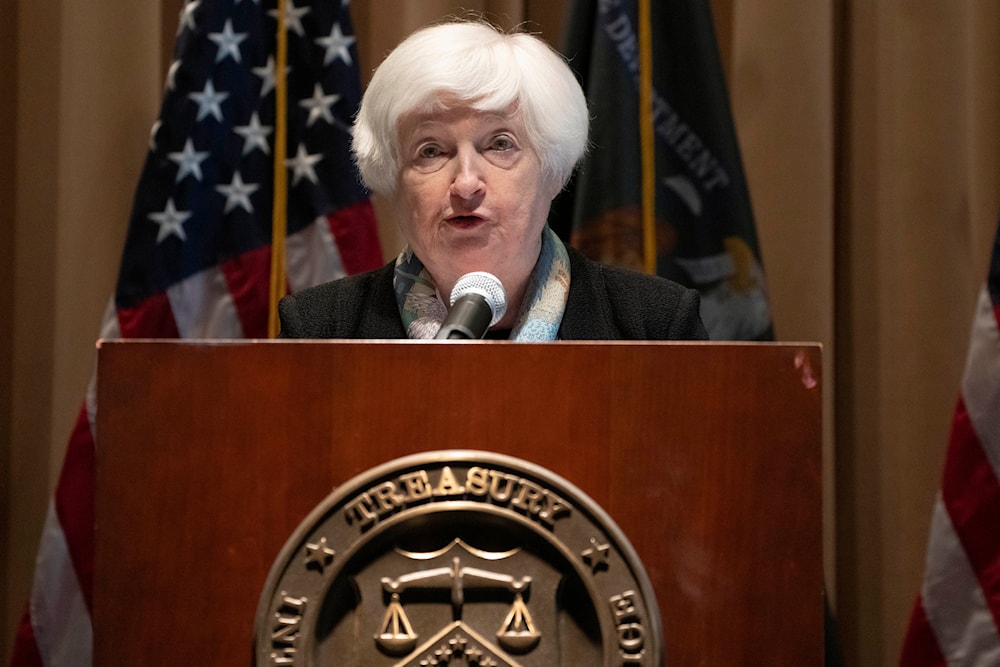Former US Treasury Secretary says Trump tariffs policy 'misguided'
Yellen slams Trump’s tariff strategy as "misguided," warning it lacks clear objectives, risks harming US households, and could weaken global economic ties, especially with China and Vietnam.
-

Former US Treasury Secretary Janet Yellen speaking at the IRS on November 7, 2023, at IRS headquarters in Washington. (AP Photo/Jacquelyn Martin)
Former US Treasury Secretary Janet Yellen criticized US President Donald Trump's tariff strategy as "misguided," saying the logic behind it lacks clarity and coherence.
Speaking to Bloomberg TV, Yellen said, "Well, frankly, I think the entire policy has been misguided. The objectives are unclear. The rationale for the tariffs that have been announced really unclear and not at all sensible. Steps toward removing the tariffs, lowering them are positive, but we are in a world of tremendous uncertainty."
She also questioned the decision to impose steep tariffs on Vietnam, pointing out that the US had previously encouraged Vietnamese manufacturing as a way to diversify global supply chains for national security.
With regards to China, Yellen suggested Beijing would likely ease its trade barriers if Washington did the same, warning that the tariffs risked burdening US households and weakening economic ties between the two countries.
Yellen also noted that recent bond market turbulence and a softening US dollar signaled a potential “loss of confidence,” although she said the situation hasn’t yet warranted intervention from the Federal Reserve.
Trump had announced a reciprocal tariff policy on April 2, setting a base rate of 10%, to be adjusted based on what each country charges US imports.
A week later, he introduced a 90-day pause for all countries except China, which remained subject to steeper tariffs. As tensions escalated, US tariffs on Chinese goods soared to 145%, while China’s duties on American products reached 125%.
US allies still in the dark on Trump's tariff goals
On Saturday, Trump's latest round of tariff impositions threw global trade diplomacy into disarray, with US allies expressing growing frustration over Washington's lack of clarity and consistency. According to a report by Politico, diplomats from over 15 countries have voiced confusion about the true aims behind the White House's escalating protectionist agenda.
"We really don't know what the Trump administration wants," admitted one Asian diplomat, reflecting widespread sentiment among trade partners who remain sidelined from any substantive dialogue with Washington.
While Japan, South Korea, Vietnam, and India have reportedly engaged in limited discussions with US officials, the selective nature of these talks has raised suspicions that Washington is attempting to isolate China through ad-hoc dealmaking rather than coherent policy. Observers note that this piecemeal approach only reinforces China's argument that the US is undermining multilateralism in favor of unilateral coercion.
European officials are equally perplexed, unsure whether Trump's tariffs are meant to extract short-term concessions or represent a deeper shift toward economic nationalism. As one EU diplomat told Politico, the uncertainty stems from not knowing if this is "a deal-making strategy or the start of a paradigm shift." Former US Ambassador to Japan Ken Weinstein added that Washington appears to be testing "how far can people go to please the administration," a comment conveying the erratic nature of the current US trade posture.

 3 Min Read
3 Min Read










